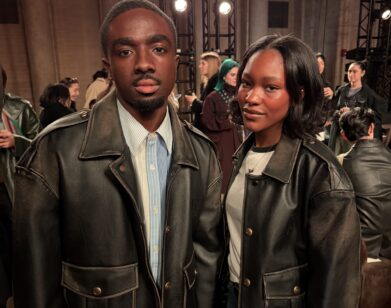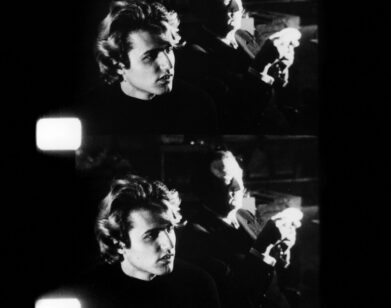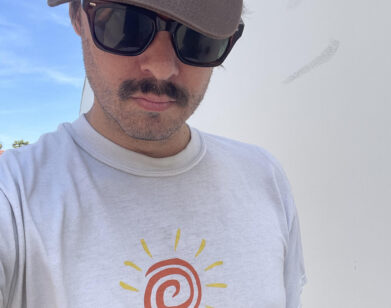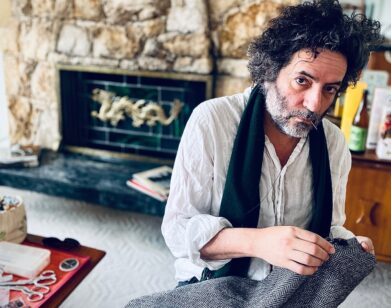DIRECTOR
James Mangold Tells Elle Fanning How He Got Inside Bob Dylan’s Head
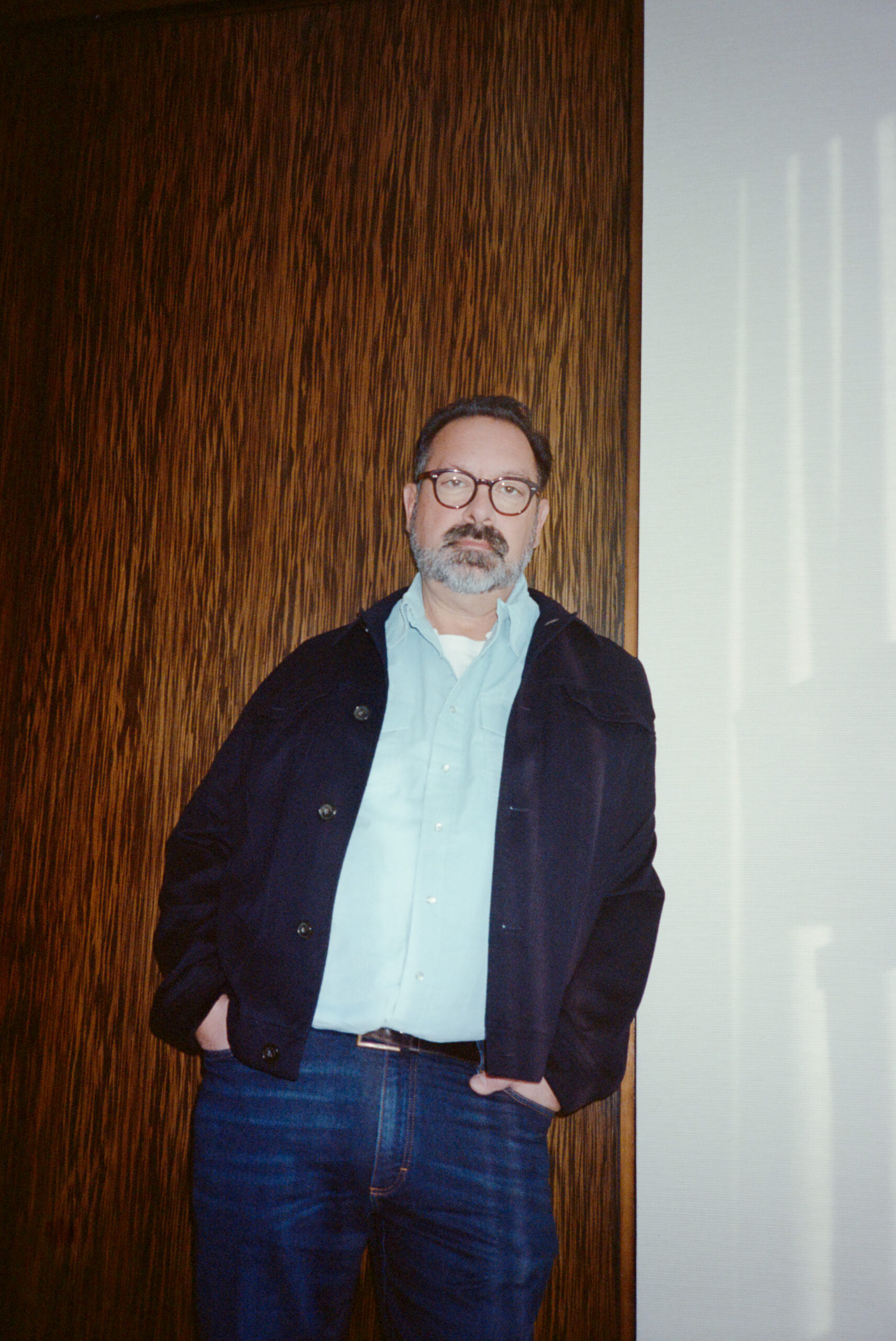
James Mangold, photographed by Luca Bertea.
When it comes to directing, James Mangold is a master of reinvention. Over three decades, he’s tackled everything from franchise IP (Logan and Indiana Jones and the Dial of Destiny), gritty westerns (3:10 to Yuma), psychological thrillers (Girl, Interrupted), and Oscar-winning biopics (Walk the Line). For his latest project, Mangold turns to Bob Dylan’s early years in A Complete Unknown, starring Timothée Chalamet as the mercurial singer-songwriter. But don’t expect typical music biopic tropes like trauma and addiction. “If anything, I think he just had this unique problem of being a rock star who doesn’t like crowds,” Mangold told Elle Fanning when the two connected over Zoom earlier this month. Fanning had been honored by the National Board of Review for her role as Sylvie Russo, a version of Dylan’s first and perhaps most formative girlfriend. And just before that, Dylan himself tweeted his stamp of approval. In conversation, Mangold opens up about Timothée Chalamet’s monk-like dedication to the role, getting inside the head of a once-in-a-lifetime artist, and how, after thirty years of filmmaking, he still resists easy categorization.
———
ELLE FANNING: Oh, Jim.
JAMES MANGOLD: Well, first of all, congratulations.
FANNING: Yeah, that was random!
MANGOLD: Not random. You’re awesome in the movie.
FANNING: It was a shock though.
MANGOLD: It literally delayed me because I was doing the interviews and I kept having these pop-ups on my screen going, “Congratulations,” and, “Elle,” and I’m like, “What’s happening?!” I had to take a break and just to find out what was going on. Plus, did you know that Bob [Dylan] tweeted today?
FANNING: I saw that. Wow. What he said was really, really nice.
MANGOLD:It was very Bob, too. “He’s playing me or some version of me.”
FANNING: That’s really cool. Well, I’m not the most organized interviewer, but your birthday’s soon.
MANGOLD: Yes.
FANNING: I looked you up on Wikipedia, Jim.
MANGOLD: Oh dear.
FANNING: But in 12 days, so we’ll probably be together for it.
MANGOLD: I think we’ll be in London or something.
FANNING: Good to know. Okay, so I wanted to know if you wanted to start directing because of a movie that you saw. Was there an a-ha moment?
MANGOLD: Well, being 60 years old, if you travel back to when I was in eighth grade, you have to think about the movies I was seeing at the theater at that time. Within a three-year period, I saw Jaws, Apocalypse Now, The Godfather, Chinatown. This is what was in my little upstate cinema. One Flew Over the Cuckoo’s Nest. There were no superhero movies, there were no Jurassic Park 5, there were no franchises of that kind. And my parents were painters and artists and unconventional in the sense that my dad would just take me out to see 2001 or Taxi Driver when I was wildly inappropriate to be seeing those movies at that time. Also, my earliest experiences of movies were completely traumatic. My parents took me to see Mary Poppins when I was three and I screamed so loud, they had to take me out of the movie theater.
FANNING: What scared you in Mary Poppins?
MANGOLD: The whole enormity of it just freaked me out. I don’t know if they still did this in your lifetime, but CBS would run The Wizard of Oz every year at Christmas, and I was so scared by the Wicked Witch of the West that I would fucking run under the bed and hide. Movies had this incredible power for me. And my dad, when I was about 12 or 13, got a Super 8 camera to take family movies and I just commandeered it started to make movies.
FANNING: Did you do it with your friends?
MANGOLD: At first, I just did it with my family. I did a movie about my family getting trapped in a flood and I built this little miniature valley and used these giant tanks of water to dump on my miniatures, and I shot them in slow motion so the water looked bigger. I was a total geek.
FANNING: It sounds like your parents were really encouraging.
MANGOLD: They were. Anything their kids did that was creative, there was really no limit. I maybe could have been a musician, but I’m not really that good. I never thought of myself as much of a writer, but I think I’m okay now. I could draw, but filmmaking was this wonderful thing where it took all the things I loved, like drawing, painting, photography, acting and music, and put them in one place.
FANNING: Yeah, totally. We haven’t had a lot of questions about the comparison between Walk the Line and A Complete Unknown, but of course there’s a parallel about a famous musician. But I also feel like the movies are so incredibly different.
MANGOLD: They’re incredibly different. The difference to me is that Walk the Line is a deeply old-fashioned Freudian story of a guy who’s traumatized in childhood, and then carries his psychological trauma into adulthood, and then becomes an addict and can’t cope with success. And then this wonderful woman comes into his life and he doesn’t know how to actually navigate that, because he still hasn’t dealt with the psychological shit in his past. In our movie, I felt like it would be exactly the wrong thing to try and take Bob and turn him into this kind of psychological model of damage. If anything, I think he just had this unique problem of being a rock star who doesn’t like crowds.
FANNING: I think his songs are quite cynical, and he’s making fun of the establishment. The songs are quite hilarious, and he’s definitely in on the joke.
MANGOLD: Yes, Timmy and I came up with this thing and it was very instinctual where I kept wondering if applause feels weird to him. I thought Bob might have this real social issue with how to cope with being adored by strangers or even just people coming at him. I don’t know if you remember, but even when we did that Chinese restaurant scene between you and him, Timmy was taking these sharp looks sometimes around the room, like if someone put a plate down. And that came from this whole thing he and I talked about, that he’s always battling the fact that every interruption becomes a kind of attack that prevents him from maybe solving the riddle that was in his head about a lyric idea. So that became this idea that, if there was an issue for Bob in the movie, it’s that he didn’t know how to navigate all the shit people wanted from him, besides the songs.
FANNING: Yeah, and Timothée does it so beautifully. I remember when he comes to Sylvie’s apartment and that’s the one moment that you actually see Bob kind of break down.

MANGOLD: I agree. When Bob Dylan read the script, that was the scene I was most nervous about him going, “No.” I thought I was veering very close to the psychological reveal of his senses. I mean, people kept asking where do the songs come from, but they don’t really want to know where the songs come from. They want to know why the songs didn’t come to them. And what he’s essentially saying is, “A lot of the shit that presents to me as love and admiration is actually envy and resentment, and I feel it.” And in my own small way, I totally understand. I projected that onto Bob’s discomfort with praise or also, we’ve both been through this millions of times, the way people praise you by also sticking a knife in your ribs at the same time.
FANNING: One hundred percent.
MANGOLD: It’ll be the equivalent of someone going, “I like this movie so much better than your last one.” And you’re like, “Why did you have to do that? Now do I have to feel bad about how little you like my last one?”
FANNING: Or when people say, “You’re so much prettier in person.”
MANGOLD: Right. “God, fire my lighting team and makeup person.”
FANNING: What was the first meeting with Timothée like? Where did you meet him?
MANGOLD: When I got handed the materials for the movie, it was when I was going to Telluride, in September of 2019. All I was told was, “Here’s what we got, here’s what it’s about, and Timmy Chalamet is kind of curious about doing it.” But I loved Bob Dylan, and I thought Timmy would be perfect. Not only do I think he’s really gifted actor, but I also felt what was interesting about the movie was it was about almost someone’s growing up, the transition from childhood into adulthood by someone that we think of as this fixture of attitude and arrogance and knowingness, and that we would be meeting him at a moment where if he had a knowingness, it would be a kind of magic dust or something, it wouldn’t be fully formed yet. And then, 10 days later, I was at the Toronto Film Festival with the same movie, and Timmy came to my hotel room and we jabbered for an hour, and I just adored him. And I never looked back. And he went out and bought a guitar and just started working.
FANNING: Wow, that’s so cool. I mean, he’s so unbelievable in the film, although I never doubted that he would be, but he really exceeded my expectations.
MANGOLD: Honestly, my only question about him was just how when he was really young, he was like bouncing off walls.
FANNING: Unbelievably. I mean, his gestures–
MANGOLD: Yes. And pacing. There was a kind of super-manic thing, and I was like, “Is he going to be able to focus?” But I believed he would. And over the five years we worked on this, something changed and he dropped into something where he kind of shut out his world and he was living this kind of monk-like existence in an apartment and coming to set. And that focus really shows.
FANNING: Yeah. Was there a moment on set or in rehearsals that you felt like, “This is really going to work?” That sounds so cheesy, but I don’t know, I’m an actor that saves everything because I don’t want to show.
MANGOLD: What do you mean saves everything?
FANNING: Like when we’re in rehearsals, there’s something about the first take. And I would specifically imagine with the singing, there’s an adrenaline that you get from doing something for the first time. Obviously he had to record and you’ve heard him sing and play the songs, but was there a moment on set or the first performance that you saw?
MANGOLD: Yes. You weren’t there. It was when we were in the hospital, the first scene where he sings. I was in tears that night. I was so out of my body going, “We may actually pull this off.” It was this whole process question, which is we had recorded all of the tracks of the movie in advance, and we had these perfect produced versions of the songs. That was a kind of backstop that we viewed as like, well, what if he gets a sore throat? Or what if he can’t do these fingerings on the day? And most often, when people make these movies, they use playback tracks. But in prep, Timmy had found this laser focus and I could tell, day-to-day, he was getting stronger and stronger as a musician. And when we arrived on that day, he was just adamant about wanting to do it for real. The music producer and the sound people were all like, “Wait a second, we can’t record this. We have this beautiful track, and if you cut to anyone else and you come back to him, he won’t be playing at the same speed and there’ll be all these problems.” And Timmy and I just kind of said, “No, we’re going to do it like this.” I believed in him, he believed in himself. And he sat down and he did this song. It’s one of these moments where, as an actor, you have to be good enough performing the job that your character does, that the other characters can all kind of drop their jaws and go, “Holy shit, he’s good,” and be credible. But he also has to be raw and unformed enough that he gives himself somewhere to grow in the course of the movie.
FANNING: So why did you want, at this point in your career, to take on this story of this slice of Bob Dylan’s life at a time where he didn’t want to be constrained?
MANGOLD: Well, I love that during this period of Bob’s life, he’s not Bob yet, so that gives us incredible creative latitude. He’s just this guy and you get to watch Bob happen. So that’s that part of it. But I love so many kinds of movies. When we started this talk, I said I love Jaws, I love Indiana Jones, I love Alien, but I also love Bergman films and westerns. And my mom said something about painting, which was that you don’t have to worry about bringing you, because “you” isn’t the intellectual part. It’s you making this painting. So you could be painting a portrait or you could be painting a house, but it’s still going to be yours. And that’s ringed in my head for so long, but I always felt somehow that I see directors sometimes trying too hard to go, “Look, it’s me doing that shot you know I do.” And I go, “Yeah, but does that shot belong in this scene?” Or is it what the audience wants or is it actually kind of branding yourself, asserting yourself as it were, because you’re who you are and this is what you do?
FANNING: Right, you have your stamp on it because you are you.
MANGOLD: Yes. And that’s what that advice from my mom was that you always have your stamp because it’s you. Even in this movie, everyone’s like, “You’re back to the biopic” and you’re like, “Oh my god, it’s another box”. But the truth is, Ford v Ferrari, everyone called it a car movie, but it was a biopic. It’s a true story about artists building a car and winning a race. And when I look at film history, Billy Wilder, who’s a director I really admire, he’s famous for making comic films, but he didn’t make a funny movie until his 15th movie.
FANNING: Wow.
MANGOLD: I’ve only made 12 movies.
FANNING: You haven’t even hit your stride yet.
MANGOLD: Right. I may discover I’m the comedic director of the 20th Century. Who knows?
FANNING: You’re the horror director of history.
MANGOLD: Right. I could become Alfred Hitchcock. So I just keep going. If I have the room to play and they give me money, and I get wonderful people like you to join me on the journey, why not keep playing?
FANNING: Thank you so much. Love you, Jim.
MANGOLD: We had a good time.
FANNING: I’ll see you tonight at our Q&A.

